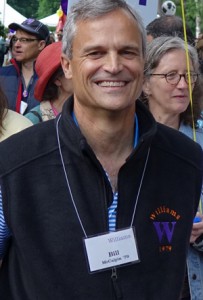By Julia Munemo
When Bill McCalpin ’79 was teaching a Winter Study course on social entrepreneurship at Williams in 2013, he told his students that when he graduated there were plenty of “slots” for recent college graduates. “All I had to do was find mine,” he says. He was pointing out that in today’s world, “more students will need to create their own paths into the workforce and be the architects of their careers.”
McCalpin has some experience with that. “My career path has been far from linear,” he says. “I have strung together an untraditional collection of professional experiences and found a way to bring all of that together in the position I now have the privilege to hold.”
McCalpin is the chief executive officer of Imprint Capital, which focuses on what it calls “impact investing.” When clients want to put their money to work for a better future, they come to Imprint Capital. Maybe they want a world less dependent on carbon, or there is a social concern they want their investment dollars to support. Rather than making donations to the cause, they invest in business opportunities that will help achieve—and sustain—these goals.
“Imprint Capital is at the leading edge of this new industry,” McCalpin says. “No one else has been around as long or has as extensive an investment track record.” As the relatively new CEO—he arrived in the San Francisco office last October—he has the chance to grow and develop along with the seven-year-old company.
McCalpin majored in economics at Williams and after graduation accepted a fellowship to teach in Hong Kong for two years. When he returned, he completed law school, although, he says, “I knew by graduation that I wasn’t cut out for the practice of law.” So he reached out to a contact he’d made during his fellowship—the executive vice president of the Rockefeller Brothers Fund. His first job out of law school was managing Rockefeller Brothers’ grants in the U.S. and Asia.
“There are two businesses within any foundation,” McCalpin says. “Making money and giving it away.” After a couple of years working on the philanthropic side of the business, McCalpin was asked to help out on the investment side. Despite having no investment experience, he leapt at the opportunity and, he says, “pretty soon I started to wonder why the worlds of making and disbursing money needed to be so separate.”
When offered a job at the MacArthur Foundation, McCalpin saw a chance to find out if he could bring those worlds together. “My role at MacArthur was to range across the long-term asset portfolio and look for good investments that had the potential to advance one or more of the foundation’s philanthropic interests,” he says. “That’s where I began to explore this notion of being a good investor and trying to effect social change in the world.”
In time, Rockefeller Brothers called him back to take his retiring mentor’s job. “I had not yet managed people or the culture of an organization,” he says “I wanted to add that to my portfolio.” As executive vice president and COO of Rockefeller Brothers Fund, he had ample opportunity to do so .
That experience came in handy when the folks at Imprint Capital reached out and asked him to move to California. His interest in what he calls “bringing investments and social change together” had threaded through his career—but at Imprint Capital, it’s the main focus.
“I credit my Williams education for the curiosity, confidence, and courage to take an unusual path,” he says. “I believe the emphasis the college puts on experiential learning today is a wonderful complement to the classroom experience and will help students acquire other skills and sensitivities they will need to chart their own paths.”
To learn more about Imprint Capital, visit its website.